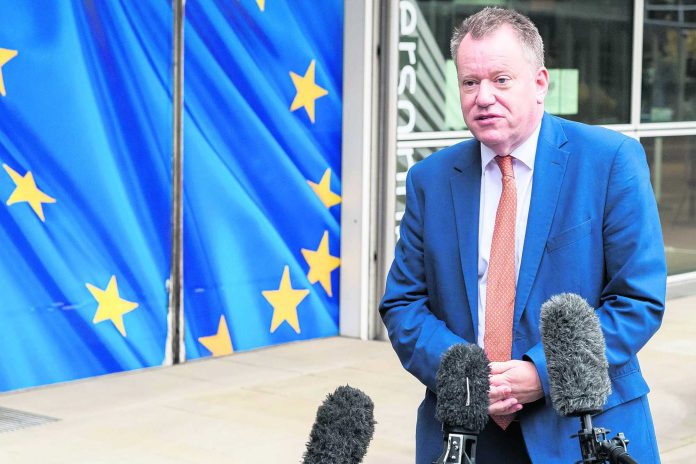
By RAF CASERT
Associated Press
BRUSSELS (AP) — One year after the Brexit trade deal was supposed to end acrimony between the European Union and the departed United Kingdom, both sides showed Friday that theirs is still a relationship tainted by bad blood and accusations of bad faith.
They did postpone talks on their continued deep-seated differences into the New Year, a welcome respite since their trade negotiations last year slipped deep past countless deadlines and into Christmas Eve before an awkward compromise was found.
But on a day when the 27-nation bloc was counting on some positive feedback for what it saw as a breakthrough proposal to regulate medicine trade in Northern Ireland — which is part of the United Kingdom but also part of the EU’s trading system — it got a lukewarm response.
Almost all other issues under discussion got a cold shoulder.
In a 13-point statement rife with complaints about perceived EU foot-dragging, ill will and sleight-of-hand in Northern Ireland, U.K. Brexit negotiator David Frost concluded: “It is disappointing that it has not been possible to reach either a comprehensive or worthwhile interim agreement this year.”
His EU counterpart, Commission Vice President Maros Sefcovic shot back from the bloc’s Brussels headquarters that “if the UK would reciprocate our efforts, our energy and our ambition we bring to these discussions we could be much more advanced by now.”
Frost said that suspending parts of the Brexit agreement under the so-called Art. 16 procedure was still very much on the cards.
“We remain ready to use the Article 16 safeguard mechanism if that is the only way to protect the prosperity and stability of Northern Ireland,” he said. Experts say it would only be a small step from such a suspension to a full-blown trade war between the two sides.
Making matters worse Friday, French authorities announced they will seek EU legal action against Britain over a months-long, unresolved fishing dispute. The decision came after French President Emmanuel Macron met with a delegation of French fishers.
That a tiny industry like fishing could claim such center stage in relations between the massive trade bloc and a historic ally only underscored the quick erosion of trust ever since Britain voted to leave the EU in 2016.
Often a reluctant partner, even as an EU member, Britain finally agreed on a withdrawal deal, in which the compromise on Northern Ireland has proved unwieldy and impractical.
Northern Ireland is U.K. territory but effectively remained part of the EU’s borderless trading market for goods when the U.K. left the bloc last year, causing practical problems for businesses and institutional wrangling over which side is in charge of what.
The U.K. also is insisting the EU cedes final legal oversight by its top court of any disputes on Northern Ireland trade, and instead makes them subject to independent arbitration — something the 27-nation bloc is flatly rejecting.
Governance in Northern Ireland, said Frost, “remains a fundamental issue of democratic accountability.”
The EU complains that it was the government of Prime Minister Boris Johnson that agreed to the specific deal it now objects to. Last year Britain pushed ahead with legislation that it admitted broke international law by overriding parts of the legally binding withdrawal agreement it signed with the EU.
“I can reassure you that breaching international law, breaching agreements which been signed just a couple of months ago, doesn’t create trust, doesn’t make the negotiations easier,” Sefcovic said Friday.
In October, the EU put forward a series of proposals to smooth trade between Great Britain and Northern Ireland in what it saw as a potential deal-maker, but Frost shot them down Friday.
“Although we have worked with the proposals put forward by the Commission in mid-October, they do not solve the problems, and even in some aspects take us back from the current unsatisfactory status quo,” Frost wrote.
Improving trade in medicines had been negotiated for weeks now, and Irish Foreign Minister Simon Coveney welcomed progress on the issue. He hoped it would “act as a catalyst for solving the other protocol issues early in the new year.”
The Brexit agreement gives Northern Ireland a special trade status that ensures there is an open border on the island of Ireland. It is a key pillar of Northern Ireland’s peace process since the 1998 Good Friday accord that ended years of fighting.
But it means a new customs border in the Irish Sea for goods entering Northern Ireland from the rest of the U.K., even though they are part of the same country.
That has brought red tape for businesses, and caused problems with some goods reaching Northern Ireland.















